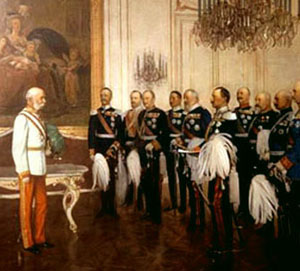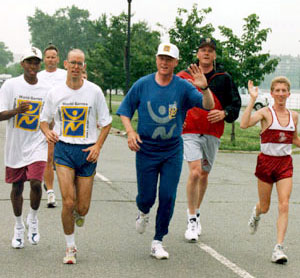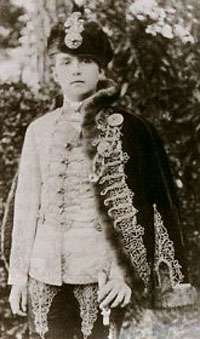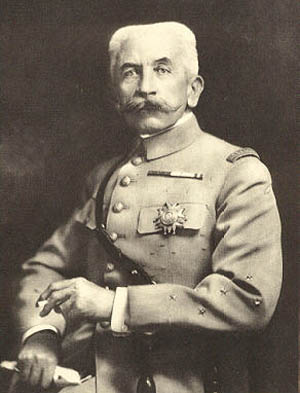 |
Formation of Children
The Value of Distinction
Marian T. Horvat, Ph.D.
Some modern men might argue that distinction in out of fashion. More and more of our politicians and leaders have jumped on the populist bandwagon, appearing in public in t-shirts and Bermuda shorts and drinking soft beverages from their bottles. They take on common mannerisms with the aim of attracting the people by “being one of them.” They are wrong. Such vulgar attitudes may win the fleeting empathy of egalitarian spirits, but nowhere does it raise true esteem and admiration, born from respect. The real leaders are those who are models for the masses.
Today, more than ever, the man of distinction must be willing to follow principles, not the modern fashions. He should be strong enough to set a superior example, different than the vulgar styles of the Revolution. Thus, he should cultivate from early years distinction in his bearing, speech and thinking.
Chapter 17 of our Small Manual of Civility describes the qualities of the true man of distinction.
If, after the glory of God, the possession of means to assure a stable situation in life for themselves and their families is the general goal of almost all men, the next place should go to the pursuit of positions of distinction and honor.
Distinction is composed of moral values, noble ways of being and action that give a man a great prestige. This distinction is so precious that many nouveaux riches, the overnight millionaires, would consent to give half their belongings in exchange for that distinction which they feel lacking in themselves.
There exists a high degree of distinction that few men possess. It consists of a harmonious conjunct of powerful capacities and rare, eminent moral qualities that surround one's very personality. This assemblage of gifts projects itself onto the physical exterior of the individual, illuminating his countenance, accompanying him like a halo, ennobling his features, directing his gestures, governing his whole person.
The distinction of the elegant man

The head of Austrian State, Emperor Franz Josef of Austria, left, receiving the heads of the German States
Below, Bill Clinton, head of the United States of America, following revolutionary fashions

|
Below this high moral distinction there is a natural distinction, resulting from a harmonious proportion of body and physical qualities, generally inherited by nature. Such would be the man of tall stature, erect body, raised head, proportioned shoulders, refined profile, fine hands, narrow neck, etc. However, from the point of view we are taking here, this distinction is easily confused with elegance.
Clearly, no one chooses his body, picks out his natural capacities, or selects his aptitudes and first tendencies. We all receive the measure that Providence handed us to achieve our destinies. But a great possibility of perfecting oneself exists in each man. Just as good spiritual practices, diligence in work, and a constant elevation of ideas and sentiments develop our character, they also confer upon us a high moral and intellectual distinction.
In the same way, our external habits and customs will impress on our mien and our posture an unequivocal air of distinction or of vulgarity, proportionate to the time and intensity of our noble or vulgar actions. Further, we know that we can correct, reform or improve habits, adapting them to the laws of good taste, polish and social convenience.
For this reason, we should work on our customs and social habits, improve our deportment and manners, and combat our more visible social defects.
For example, correct deportment gives an air of prestige and self-worth even to bodies less favored by nature with beautiful forms. Energetic action corrects laziness. A calm and self-possessed air reveals a man’s peace and tranquility of soul on his physiognomy, and instills harmony and amiability onto the features.
Gestures have a powerful influence, and when they correspond perfectly to what a man is thinking and saying, they increase twofold the strength and prestige of his words.
Facial expressions translate a man’s state of spirit
When governed, laughter and speech enhance the physiognomy; when ungoverned, they convulse the face, stealing all its polish and finesse.
One need only look at the faces of the Saints – the real faces, and not the sentimental caricatures that some religious books present – to see the distinction and nobility reflected in their features.
We recall here the story of that artist who sought many years for a model of great distinction and nobility of feature to sit for a painting of Jesus Christ in the Last Supper. He found a pious Roman monk. Some years later, after painting the eleven Apostles present, he sought a model for the last personage of the picture, Judas. After a long search, he finally discovered one man so vile and criminal of countenance that he seemed to express the traitor. The arrangements were made for the sittings.
As the artist was painting, the man began to weep. When questioned about the reason for his tears, the model answered: “I am weeping because years ago, I was the one you chose as a model to paint Our Lord Jesus Christ in this same picture. Today, I pose for you as a model of Judas.” He had apostatized from his religious vocation, turned to a criminal life, and his features and mien had degenerated to the point that he represented the opposite of that high moral perfection he had been called to achieve.
True distinction rises above human respect

Otto von Habsburg at age 10 in a traditional Magyar uniform |
Distinction is, therefore, a precious adornment of the personality, sought by the noble, esteemed among the poor, venerated by all as an incomparable jewel.
The effort to acquire such distinction – which should begin in one’s early years – can be summarized in these few words: to acquire good customs and to think on high things.
The man of distinction is never a slave to human respect. He fulfills his duties without the need to check what the people around him are thinking. He is not afraid to display his religious, political or social convictions. He does not feel diminished by the poverty, rusticity or ignorance of family members. He is not embarrassed by friendships or associations with the poor and ignorant.
The man of distinction does not boast about his awards; he does not take on ridiculous activities, like the marathon runners and sport maniacs who sacrifice their future and good for capricious, extravagant adventures.
The man of distinction does not boast about reading books by bad authors, or viewing racy movies or magazines. The man of distinction stays away from places that corrupt the intelligence and morals, and from secret societies whose programs are not openly known and discussed.
Examples of distinction
All the gifts of nature seemed to unite themselves in Pericles, a prominent and influential statesman, orator, and general of Athens in the city's Golden Age. In his youth, Pericles avoided public appearances, preferring to devote his time to study and the development of character. The first time that he spoke in public, he captivated all with his noble distinction in bearing and speech. Seeing such majestic and serene moral beauty, the Athenians compared him to a god. His eloquence, declared a poet, shone like a clarion and penetrated like a ray.

Marshall Louis-Hubert Lyautey (1854-1934) |
St. Vincent de Paul was the son of poor farm laborers of Gascony in southern France. He became the chaplain of the aristocratic Gondis family, the counselor of the Kings of France, a man who universally incarnated the spirit of evangelical charity. When he heard his father had arrived in Paris, the holy founder of the Lazarists ordered the bells to be rung. He called the Priests of his Order to the chapter hall, where he introduced the simple peasant, saying, “Reverend Fathers, I have the great pleasure to present to you my father.” It is a beautiful example of filial love and lack of human respect.
Marshall Louis-Hubert Lyautey, founder of the French Protectorate in Morocco in 1912, had no fear to openly display his Catholic convictions. On a certain occasion, he disembarked in Bordeaux on a Sunday morning. He was received with official honors, and the greeting commission presented him with a full program of festivities. There was no time, however, marked for Mass.
The Marshall pointed this out to the president of the commission with an amiable smile, saying, “But, honorable sir, something has been forgotten. Today is Sunday. At 8 o’clock I will assist at Mass, as I am accustomed to do in Morocco. I do not want to be less Catholic in France than I was in Morocco.” And at 8 o’clock the Marshall entered the church to fulfill his Catholic duty.

Posted August 6, 2007

Related Topics of Interest
 Introduction to the Small Manual of Civility Introduction to the Small Manual of Civility
 Chapter 2: Bearing Chapter 2: Bearing
 Chapter 3: How to Sit, Stand, Walk Chapter 3: How to Sit, Stand, Walk
 Chapter 4: Order and the Spirit of Order Chapter 4: Order and the Spirit of Order
 Chapter 5: Order in the Professional Life Chapter 5: Order in the Professional Life
 Dressing Well - Vanity or Virtue? Dressing Well - Vanity or Virtue?
 St. Isidore of Seville on the Importance of Being Dignified in Manner St. Isidore of Seville on the Importance of Being Dignified in Manner
 Four Ways to Discern a Man's Soul by His Appearance Four Ways to Discern a Man's Soul by His Appearance

Related Works of Interest
|
|
Formation | Cultural |
Home | Books | CDs
| Search | Contact Us
| Donate

© 2002- Tradition in Action, Inc. All Rights Reserved
|
 |
|